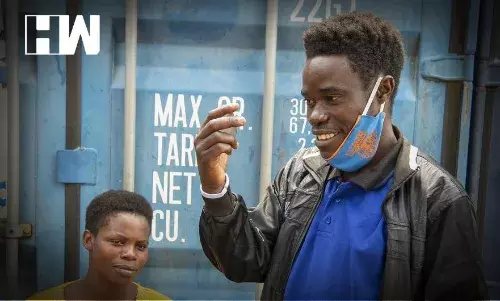Foreign combatants with armed groups in the Democratic Republic of the Congo (DRC) can find it hard to return home once they decide to stop fighting. The UN Mission in the country (MONUSCO) is helping them to demobilize, and adjust to a new life.
“I married my wife while I was fighting in the bush. Once we had a baby, I thought that we would not be safe, running from one place to another with a family, so I decided to return to my home country, Rwanda.”
26-year-old Jean-Nepo Mukeshimana is speaking at the Munigi Transit Camp, near northern Goma, where he is preparing to leave for Rwanda, after some 10 years fighting in the ranks of Raiya Mutomboki, an armed group based in Kibabi, a village in the DRC province of North Kivu.
Born to Rwandan parents who fled the 1994 genocide, Mr. Mukeshimana was born in DRC. When he was 16, his parents returned to Rwanda because the war was over, but Mr. Mukeshimana stayed, and was later recruited by Raiya Mutomboki.
“For 10 years I fought in the bush, life was hard, and we could not do anything to earn income. It was sprinting from one place to another every single day”, he says.
His wife, 20-year-old Mapenzi Uwineza, who says that Mr. Mukeshimana simply ordered her to follow him into the bush after their marriage, agrees that life was tough. “When we needed food, the combatants had to go looting, what kind of life is that? We did not have sanitary towels, so I had to improvise with old pieces of cloth. And while our husbands were away, we would be beaten by the rebels.”
Preparations for civilian life
Along with four other male ex-combatants, and their dependents – two women and five children – Mr. Mukeshimana spent two weeks in the camp, as part of MONUSCO‘s Disarmament, Demobilization, and Reintegration (DDR) programme in DRC, which has been running since 2013.
The aim of the initiative is to help in the repatriation of all foreign combatants and their dependents in the country, collect and eliminate weapons and ammunition, and ensure that the ex-combatants understand the importance of peace.
The Rwandans in the camp are expected to tell others who are still fighting in the bush that it is safe to surrender and go back home.
John Bashali works for the MONUSCO DDR programme. He says that a lack of identification papers, required by authorities in their country of origin, deters many combatants from thinking of returning home.
To make the process easier for them, MONUSCO helps ex-fighters with the paperwork. “There is a phone number that they can reach us on, with the cost of the call paid by MONUSCO”, he says. “After identifying them, they are transferred to Munigi Transit Camp ready for repatriation”.
Learning to live peacefully
Established in 2014, the camp provides basic necessities like clothing, food, sanitary kits for women, and shelter. Ex-combatants have access to news, and can take part in sporting activities.
The centre also provides them with life skills and a stipend to support them after reaching home. Once they get to Rwanda, the men spend two to three months at the Mutobo Demobilization Camp, where they learn vocational skills, so that they can make ends meet once they return to their villages.
A new chapter
As they help each other to pack their belongings, Mr. Mukeshimana and his fellow ex-fighters are clearly excited to be leaving for Rwanda.
“I have never had such a clean outfit because in the bush, I had lice all over my body”, says a jovial Mr. Mukeshimana, who is wearing a new set of clothes provided by the mission.
Prior to departing, a meal of rice and beans is served. Then, the expectant group boards a UN minibus, and their journey from Munigi to the border between DRC and Rwanda begins.
After a half-hour drive, it is time to say goodbye to DRC, and start a new, more hopeful chapter in their lives.
As an independent media platform, we do not take advertisements from governments and corporate houses. It is you, our readers, who have supported us on our journey to do honest and unbiased journalism. Please contribute, so that we can continue to do the same in future.

